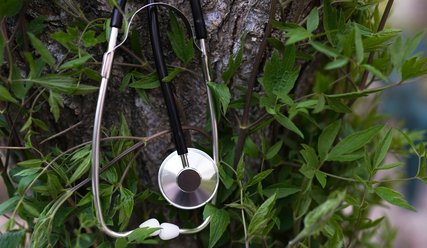Leadership in the field - meet Dr Emily Cavana
College Fellow Dr Emily Cavana has been part of the National Cervical Screening Programme (NCSP) Advisory Group for the past seven years providing advice and a GP perspective on the programme’s screening processes and implementation.
The National Screening Unit (NSU) describes the role of the advisory group is to review, critique and interpret NCSP monitoring report data and make recommendations to the NSU; to provide advice on specific areas of the programme and the strategic direction of the programme; and to help build understanding and partnership with consumer and professional groups.
As part of a new series of articles, in which we showcase the GPs representing the College and the profession, we spoke with Emily about her role and experiences with the NCSP advisory group. Before we dive into Emily’s experiences with the group, here’s a peek into the life of our wonderful GP.
Emily has been working with the Kelburn Northland Medical team in Wellington since 2011 and as a youth health doctor at Vibe since 2007. She has a Bachelor of Science from Victoria University in Wellington; a Bachelor of Medicine and Surgery from Flinders University in Australia, and is a GPEP2/3 Medical Educator.
She also has a special interest in women’s health, LGBTQ and youth health. She proactively advocates for general practice in the health sector - all while doing her day job and wrangling her two energetic children. We are fortunate to nab her for a quick interview. Cue, Emily!
Can you tell us about your specific role with the group?
“The group usually meets twice a year. As a member of the frontline I provide advice that relates to general practice and wider primary care. Alongside me, primary care is represented by a nurse practitioner. The group is quite big and all facets of cervical screening are represented including lab technicians, hospital specialists and of course members of the Ministry screening team. It’s a great opportunity to make sure that general practice has its voice heard.”
What would you say have been your key learnings or experiences from being with the group?
Emily says that as a GP with limited governance experience, it has been fascinating seeing how the advisory process works. “Until this experience, I’d never sat in a full day meeting! It is so different from my day to day work, but I have thoroughly enjoyed working with others in the health sector and learning what they do. It has been a huge shift in thought process for me. Would I do this again? Absolutely.”
Have you encountered any challenges during your time with the group?
“I haven’t experienced any challenges with the group itself, but there have been some interesting issues in relation to how the programme is implemented. For example, the testing modality has been reviewed and changed over the years. In 2009 (before I started on the group) the mode of test being sent to the lab changed from being “smeared” onto a slide to being dunked in a pot of liquid.
These two tests still look at the cells from the cervix, but use different techniques. This didn’t change much for the woman owning the cervix, or for the clinician taking the screen, but it made quite massive differences for the people in the lab and was generally a better test.”
“The next big change we faced was the discussion around a full change of testing modalities. From looking at cervical cells (cytology) to checking for the virus (HPV) that we know causes the majority of cancers. There was a lot of debate when this decision was reached, in New Zealand we already had an excellent screening programme and this was a reasonably new testing modality that hadn’t been trialled extensively. There was a lot of time pressure to make the decision, in order for it to be approved by parliament.
"This decision was made to switch to virus testing (HPV) as it’s a better screening test and leads to less harm. It is still to be decided when New Zealand will adopt this new testing regime but, in the meantime, we have introduced a new starting age for cervical screening from 20 to 25. Screening women who are aged 20 to 24 has been shown to be ineffective at preventing cervical cancer and the age change is in line with international best practice. One of the great things about HPV testing, when we do adopt it, is the opportunity for women to test themselves, this discussion is ongoing to get the best outcome for all women and improve equity.
“We are now facing a new challenge from an unexpected source. Covid-19 has had a massive impact on screening. The routine programme ceased entirely during Alert Level 4. Around 50,000 cervical screens that would usually have occurred, didn’t. We need to get back to screening promptly to deal with this backlog.”
Are there any resources from the programme or group that you’d recommend to members?
“The Ministry of Health has the best resources on this work.
“These newly developed guidelines are hot off the press and have been thoroughly reviewed and made as primary care friendly as possible. Because of the recent cervical screening starting age change to 25 in New Zealand the guidelines contain some really useful advice around management of some of the complexities of the under 25s.”
Do you have any advice to members interested in becoming a GP representative?
“My advice is that if you’re interested in a position, just apply. It’s a great opportunity and you develop an appreciation for how the system works. It encourages you to have a different perspective and it keeps your job interesting and broad.”
On a final note, is there anything else you’d like to share with members?
“Being in the group has been an excellent experience and has influenced my focus and slant on women’s health. I think I would have benefited from talking with another GP representative before I started on the group, so I knew how to approach my first meeting and what to expect. The experienced reps might not need as much guidance or advice, but the green ones could really benefit from it.”
Emily floated the idea of introducing a GP ‘reps’ peer group, but wasn’t sure if GPs would have the time in the evening to do a zoom meeting, on top of everything else they do! What do you think? Send your recommendations to communications@rnzcgp.org.nz
Can you tell us about your specific role with the group?
“The group usually meets twice a year. As a member of the frontline I provide advice that relates to general practice and wider primary care. Alongside me, primary care is represented by a nurse practitioner. The group is quite big and all facets of cervical screening are represented including lab technicians, hospital specialists and of course members of the Ministry screening team. It’s a great opportunity to make sure that general practice has its voice heard.”
What would you say have been your key learnings or experiences from being with the group?
Emily says that as a GP with limited governance experience, it has been fascinating seeing how the advisory process works. “Until this experience, I’d never sat in a full day meeting! It is so different from my day to day work, but I have thoroughly enjoyed working with others in the health sector and learning what they do. It has been a huge shift in thought process for me. Would I do this again? Absolutely.”
Have you encountered any challenges during your time with the group?
“I haven’t experienced any challenges with the group itself, but there have been some interesting issues in relation to how the programme is implemented. For example, the testing modality has been reviewed and changed over the years. In 2009 (before I started on the group) the mode of test being sent to the lab changed from being “smeared” onto a slide to being dunked in a pot of liquid.
These two tests still look at the cells from the cervix, but use different techniques. This didn’t change much for the woman owning the cervix, or for the clinician taking the screen, but it made quite massive differences for the people in the lab and was generally a better test.”
“The next big change we faced was the discussion around a full change of testing modalities. From looking at cervical cells (cytology) to checking for the virus (HPV) that we know causes the majority of cancers. There was a lot of debate when this decision was reached, in New Zealand we already had an excellent screening programme and this was a reasonably new testing modality that hadn’t been trialled extensively. There was a lot of time pressure to make the decision, in order for it to be approved by parliament.
"This decision was made to switch to virus testing (HPV) as it’s a better screening test and leads to less harm. It is still to be decided when New Zealand will adopt this new testing regime but, in the meantime, we have introduced a new starting age for cervical screening from 20 to 25. Screening women who are aged 20 to 24 has been shown to be ineffective at preventing cervical cancer and the age change is in line with international best practice. One of the great things about HPV testing, when we do adopt it, is the opportunity for women to test themselves, this discussion is ongoing to get the best outcome for all women and improve equity.
“We are now facing a new challenge from an unexpected source. Covid-19 has had a massive impact on screening. The routine programme ceased entirely during Alert Level 4. Around 50,000 cervical screens that would usually have occurred, didn’t. We need to get back to screening promptly to deal with this backlog.”
Are there any resources from the programme or group that you’d recommend to members?
“The Ministry of Health has the best resources on this work.
“These newly developed guidelines are hot off the press and have been thoroughly reviewed and made as primary care friendly as possible. Because of the recent cervical screening starting age change to 25 in New Zealand the guidelines contain some really useful advice around management of some of the complexities of the under 25s.”
Do you have any advice to members interested in becoming a GP representative?
“My advice is that if you’re interested in a position, just apply. It’s a great opportunity and you develop an appreciation for how the system works. It encourages you to have a different perspective and it keeps your job interesting and broad.”
On a final note, is there anything else you’d like to share with members?
“Being in the group has been an excellent experience and has influenced my focus and slant on women’s health. I think I would have benefited from talking with another GP representative before I started on the group, so I knew how to approach my first meeting and what to expect. The experienced reps might not need as much guidance or advice, but the green ones could really benefit from it.”
Emily floated the idea of introducing a GP ‘reps’ peer group, but wasn’t sure if GPs would have the time in the evening to do a zoom meeting, on top of everything else they do! What do you think? Send your recommendations to communications@rnzcgp.org.nz


